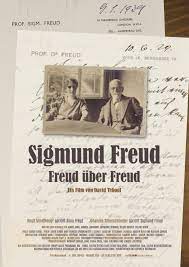![]()
France | Austria 2020
Opening May 5, 2022
Directed by: David Teboul
Writing credits: David Teboul, Francois Prodomidés
Principal actors: German version spoken by Birgit Minichmayr, Johannes Silberschneider, André Jung, Andrea Jonasson, Catherine Deneuve, Sylvie Rohrer, Roland Koch
 Sigmund Freud was born May 6, 1856, of a Jewish family. He was gifted at school, surrounded by books his whole life, and read the Bible, as well as the family’s Torah at age seven. By 1886 he was established in Vienna with a medical practice to treat patients suffering from mental problems. The same year he married Martha (whose grandfather was a rabbi in Hamburg) and they had six children; his youngest daughter, Anna, followed his career visions. He worked with others in the same field, including Carl Gustav Jung; they presented their work in Zurich, but this friendship eventually ended. In 1908 he attended the first International Convention of Analysis in Salzburg.
Sigmund Freud was born May 6, 1856, of a Jewish family. He was gifted at school, surrounded by books his whole life, and read the Bible, as well as the family’s Torah at age seven. By 1886 he was established in Vienna with a medical practice to treat patients suffering from mental problems. The same year he married Martha (whose grandfather was a rabbi in Hamburg) and they had six children; his youngest daughter, Anna, followed his career visions. He worked with others in the same field, including Carl Gustav Jung; they presented their work in Zurich, but this friendship eventually ended. In 1908 he attended the first International Convention of Analysis in Salzburg.
Can you remember your childhood dreams? Freud definitely could; analyzing dreams was part of his work. Can you imagine lying on a bed with someone sitting behind you encouraging a conversation about your thoughts? That’s Freud. He was an expert in hysteria and hypnosis. He originated the terms “libido” and “Oedipus complex” and “id, ego, superego” to describe his patients’ symptoms. He shared his work on trips to New York and Massachusetts, USA. He wrote books such as Das Unbehagen in der Kultur and Totem und Tabu. In the 1930s anti-Semitism was spreading in Europe and Freud, and his family fled Vienna, arriving in London on June 6, 1938, where he died on September 23, 1939, famous as the Father of Psychoanalysis.
This biographical documentary follows Freud’s life through childhood to his final days as he develops new fields to interpret human behavior. Although of Jewish heritage, he didn’t seriously practice the faith. He was interested in Christianity, but also only as a topic. He was the oldest of eight siblings; four of his Jewish sisters died in concentration camps during World War II, having remained in Vienna. Director David Teboul did much research sorting through many letters, files and family history; valuable archives had also been collected by Freud’s youngest daughter Anna, who died in 1982. As a result, much of the film is original photography in black and white, showing, for example, Sigmund at age three, picking flowers in a field. It is interesting to see the fashions of the 1800s. And of course, it is extremely interesting to learn about Sigmund Freud, who still has an important influence on medical practices today. ()
